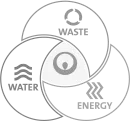In many areas of the United States, dealing with bitter cold winters are a reality for the people who live there. If you reside in a cold-winter climate, you’ve surely learned through experience how to stay safe when the temperatures drop. To further expand your knowledge of winter weather safety, here are some safety tips for your home and vehicle from Veolia’s safety team.
FOR THE HOME
Keep your eye on the sky – and forecasts. Although periods of extreme cold cannot always be predicted far in advance, weather forecasts can sometimes provide you with several days’ notice. Listen to weather forecasts regularly, and be well-versed on the meaning of various weather warning terms, including:
- Winter weather advisory (expect winter weather conditions to cause inconvenience and hazards)
- Frost/freeze warning (expect below-freezing temperatures)
- Winter storm warning (take action; the storm is in or entering the area)
- Winter storm watch (be alert; a storm is likely)
- Blizzard warning (seek refuge immediately! Snow and strong winds, near-zero visibility, deep snowdrifts and life-threatening wind chill).
If you plan to use a fireplace or wood stove for emergency heating, have your chimney or flue inspected each year. Ask your local fire department to recommend an inspector, or find one in the yellow pages of your telephone directory under “chimney cleaning.” Also, if you’ll be using a fireplace, wood stove, or kerosene heater, install a smoke detector and a battery-operated carbon monoxide detector near the area to be heated. Test them monthly, and replace batteries twice a year.
Your ability to feel a change in temperature actually decreases with age, and older people are more susceptible to health problems caused by cold. If you or a family member are over 65 years old, place an easy-to-read thermometer in an indoor location where you will see it frequently, and monitor the home temperature closely.
Insulate any water lines that run along exterior walls of your home so your water supply will be less likely to freeze. If your pipes do freeze, do not thaw them with a torch. Thaw the pipes slowly with warm air from an electric hairdryer.
To the extent possible, weatherproof your home by adding weather-stripping, insulation, insulated doors and storm windows, or thermal-pane windows.
If you have pets, bring them indoors. If you cannot bring them inside, provide adequate shelter to keep them warm and make sure that they have access to unfrozen water.
Have a week’s worth of food, water and safety supplies on hand in your home. If you live far from other people, it would be prudent to have an even larger supply.
FOR YOUR VEHICLE
You can avoid many dangerous winter travel problems by planning ahead. Keep up on your manufacturer-recommended maintenance program, plus every fall you should:
- Have the radiator system serviced, or check the antifreeze level yourself with an antifreeze tester (add antifreeze, as needed)
- Replace windshield-wiper fluid with a wintertime mixture
- Replace any worn tires, and check the air pressure in the tires
- During winter, keep the gas tank near full to help avoid ice in the tank and fuel lines
Store extra winter clothing and essential supplies like a first aid kit, flashlight and batteries, a car phone charger, non-perishable food items, a fire source like matches, sand and salt, and a shovel in your vehicle, just in case you ever are broken down during winter weather.
This information is provided by Veolia North America to help you protect your personal safety. Content is drawn from the U.S. government’s Occupational Health & Safety Administration (OSHA) website and other online safety resources.

Veolia is uniquely positioned to service industry, government and commercial entities in improving performance, managing water, waste and energy.
Learn how


